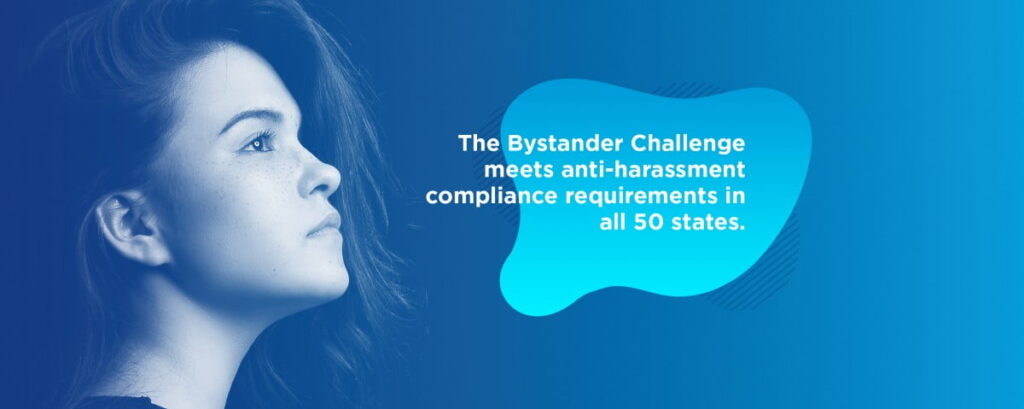
THE BYSTANDER CHALLENGE: BYSTANDER INTERVENTION & ANTI-HARASSMENT TRAINING
The Bystander Challenge Meets Chicago’s Bystander Intervention and Sexual Harassment Training Requirement
The Chicago Commission on Human Rights recently enacted a new ordinance that enhances protection for all employees when it comes to sexual harassment. The previous sexual harassment training mandated by the State of Illinois under 775 ILCS 5/2/2-109 meets the City of Chicago’s one-hour sexual harassment training requirement, however, the City’s new law expands on this. The major changes that the new City of Chicago ordinance brings are a broader legal definition of sexual harassment, a required additional hour of prevention training for supervisors and managers, and one hour of bystander intervention training for all employees annually. Companies with five or more employees have until June 30, 2023, to begin providing this training.
While notices and directives abound in workplaces to raise awareness of what constitutes harassment or discrimination, few programs teach people how to communicate to their coworkers when they perceive red flags. NCRC’s strength is teaching people how to have challenging conversations in ways that demonstrate respect, inclusiveness, and dignity for everyone involved. This workshop on empowering bystander communication builds on the tools we know work to help employees gain confidence in conducting these conversations. Thoughtful interactive exercises and reflective conversations help create a safe space to learn. Weaving in values, clarification, and specific communication skills development, NCRC’s bystander workshop gives participants more confidence to react to these situations effectively.
Colleagues in a work environment often hear comments and witness behaviors that can escalate to the point of harassment. Increasingly, bystanders are being asked to take action because when disrespectful behavior is left unaddressed, it is more likely to escalate into a more serious issue.
The Bystander Challenge, fulfills the legal requirement for anti-harassment training in all 50 states in the U.S. We have multiple versions of The Bystander Challenge, which fulfill both the training requirement for both supervisory and (for some states) non-supervisory employees. Those are two different classes and we can train managers and supervisors in one group and employees in another group.
What makes The Bystander Challenge different from other anti-harassment training is that instead of only covering what harassment is, how to identify it and what to do when you see it, The Bystander Challenge looks at all of the things that lead to harassment, to try to prevent it from happening in the first place. Furthermore, it teaches the bystander how to take practical steps to address “red-flag” behavior.
The Bystander Challenge is offered both as an online course or as a live workshop (either virtual or in person). The benefits of the online course work very well for companies that have large workforces that are difficult to get together for multiple classroom sessions. The live workshop is very beneficial for groups that want to dive into some practical experience. We use examples and role-plays, to evaluate various scenarios and practice difficult conversations around these topics. Both the online course and the live version are very interactive, requiring participants to think thoughtfully and critically about the topics in front of them. Some companies opt to do a combination of both; training the majority of the workforce in the online course and then a select number of individuals in the classroom course.
There is also a version of The Bystander Challenge that doesn’t include the anti-harassment and discrimination laws. This is a great option for companies who have already found a training that fulfills their anti-harassment training requirement. We highly encourage companies to consider The Bystander Challenge even if they have already fulfilled their legal training requirements, because it demonstrates a commitment to a positive work environment where everyone feels safe and respected. By empowering employees to speak up when they see red flags, companies create an environment that prevents harassment from happening in the first place.
Send Me More Information About Fulfilling the Bystander Training Requirement in Chicago